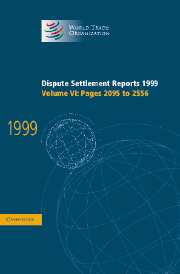Book contents
- Frontmatter
- Contents
- Canada - Measures Affecting the Importation of Milk and the Exportation of Dairy Products (WT/DS103): Report of the Panel
- Turkey - Restrictions on Imports of Textile and Clothing Products (WT/DS34): Report of the Appellate Body
- Turkey - Restrictions on Imports of Textile and Clothing Products (WT/DS34): Report of the Panel
Turkey - Restrictions on Imports of Textile and Clothing Products (WT/DS34): Report of the Panel
Published online by Cambridge University Press: 22 December 2017
- Frontmatter
- Contents
- Canada - Measures Affecting the Importation of Milk and the Exportation of Dairy Products (WT/DS103): Report of the Panel
- Turkey - Restrictions on Imports of Textile and Clothing Products (WT/DS34): Report of the Appellate Body
- Turkey - Restrictions on Imports of Textile and Clothing Products (WT/DS34): Report of the Panel
Summary
INTRODUCTION
On 21 March 1996, India requested consultations with Turkey pursuant to Article 4.4 of the Understanding on Rules and Procedures Governing the Settlement of Disputes (“DSU”) and Article XXIII:1 of the General Agreement on Tariffs and Trade 1994 (“GATT”) regarding the unilateral imposition of quantitative restrictions (“QRs”) by Turkey on imports of a broad range of textile and clothing products from India as from 1 January 1996 (WT/DS34/1).
India and Turkey did not enter into consultations, due to disagreement on the appropriateness of participation of the European Communities in such consultations, and consequently the dispute could not be resolved at that stage. The Dispute Settlement Body (“DSB”) was informed accordingly on 24 April 1996.
In a communication dated 2 February 1998, India requested the DSB to establish a panel to examine the matter in the light of GATT and the Agreement on Textiles and Clothing (“ATC”), in accordance with Article 6.2 of the DSU (WT/DS34/2). In its communication, India claimed that the restrictions imposed by Turkey were inconsistent with Turkey's obligations under Articles XI and XIII of GATT and were not justified by Article XXIV of GATT, which did not authorize the imposition of discriminatory QRs, and that the restrictions were inconsistent with Turkey's obligations under Article 2 of the ATC. India also claimed that the restrictions appeared to nullify or impair benefits accruing to it directly or indirectly under GATT and the ATC.
On 13 March 1998, the DSB established a panel pursuant to the request of India, with the following standard terms of reference (Article 7.1 of the DSU):
“To examine, in the light of the relevant provisions of the covered agreements cited by India in document WT/DS34/2, the matter referred to the DSB by India in that document and to make such findings as will assist the DSB in making recommendations or in giving the rulings provided for in those agreements.”
On 11 June 1998, the parties to the dispute agreed on the following composition of the Panel (WT/DS34/3):
Chairman: Ambassador Wade Armstrong
Members: Dr. Luzius Wasescha
Prof. Robert Hudec
- Type
- Chapter
- Information
- Dispute Settlement Reports 1999 , pp. 2363 - 2556Publisher: Cambridge University PressPrint publication year: 2002
- 6
- Cited by



